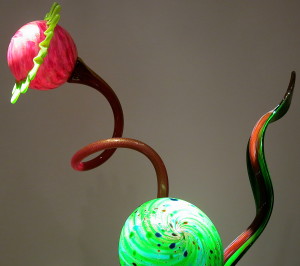When I spent two weeks at the VCCA last year, I wrote poem after poem after poem about Virginia—growing up there, burying my father there, Virginia history, Virginia sights, sounds, smells. Until one day midway through I woke up and told myself, today you will not write about Virginia. Today you will write about something else. And quite easily, fluidly, I wrote about another continent, another self. It may not be my finest poem, but it has energy and a center and I was/am glad for it. It is not like the others. But would I have written it without all those other poems, some successful, some not, that were obsessed with the same things over and over? I’ll never know for sure, but the repetitive battering of one topic both hindered my reaching that poem unlike the others and at the same time cleared a pathway.
I’ve spent the last few weeks trying to pin down what I’m currently writing about, since I often feel myself walking back down the same path. Sometimes I let my thoughts circle back through one particular groove, and sometimes I wonder if I force myself in a different direction whether all will be lost. I’m reminded of a wonderful metaphor of an inchworm as it moves along in Annie Dillard’s book The Writing Life when I think not only about the act of writing, but extends to the act of holding onto subjects, and the incremental movements through subjects and themes. They extend, they deepen, they change. And we always fear the coming to the end, the shift or return are equally terrifying:
 "The wretched inchworm hangs from the side of a grassblade and throws its
"The wretched inchworm hangs from the side of a grassblade and throws its
head around from side to side, seeming to wail what, no further?…its front three pairs of nubs rear back and flail in the air, apparently in search of a footing. What! No further? What?...By dumb luck it touches the grass….The blind and frantic numbskull makes it off one grassblade and onto another one, which it will climb in virtual hysteria for several hours."
The mind is full of bits and pieces from our lives. I’m now at an age where I don’t trust my mind as much as I used to. I have forgotten many details and stories from my life, although there are still sharp memories, clear to all the senses and to the emotions. But there are also memories that I question—is that how I felt at the time or am I seeing it through another lens? These vagaries of memory are not crucial, because art doesn’t have to be true to memory; in fact it doesn’t have to be a memory at all, but because of how I write, it is my store room. I need my hands-on access.
When my family home was dismantled, I came home to gather as much as I could. I shipped boxes, I stuffed my car so full I couldn’t see properly to drive, I had plans to come back if the powers-that-be (the sibling selling the house) would give me that time. That wish wasn’t granted, the house was cleared by someone who didn’t realize the value of some of what was trashed (I don’t mean monetary value, although there was that, too—I mean personal value, irreplaceable items, lost in the great clutter of a too-enormous house that housed my lifetime). I still ache for some of those things—only things, but like the words in literature, things imbued with a power greater than anything that can been explained or touched—I long for them in writing, and I may never be satisfied until they all have a place somewhere, back again where they should be, where I will know exactly where they are, within reach. This is what causes some things to be written. It’s the pair of a little girl’s dirty underpants visible from a tree (Faulkner’s inspiration for The Sound and the Fury), the moment a world comes into being. This is what causes some things to be read.
It’s exactly what we can only have in writing—the solidification of a moment in time, permanence.
Is this why family bibles were kept, with records so meticulously written from generation to generation? Names, dates, events, deaths? Simple sayings and moments of inspiration? And what happens when those bibles fall apart, are damaged, are thrown away? Sometimes we must start all over again, from the very bottom of our memories, from those places where we almost cannot see where we go next.
-Valerie Duff, 2015 Poetry Fellow

